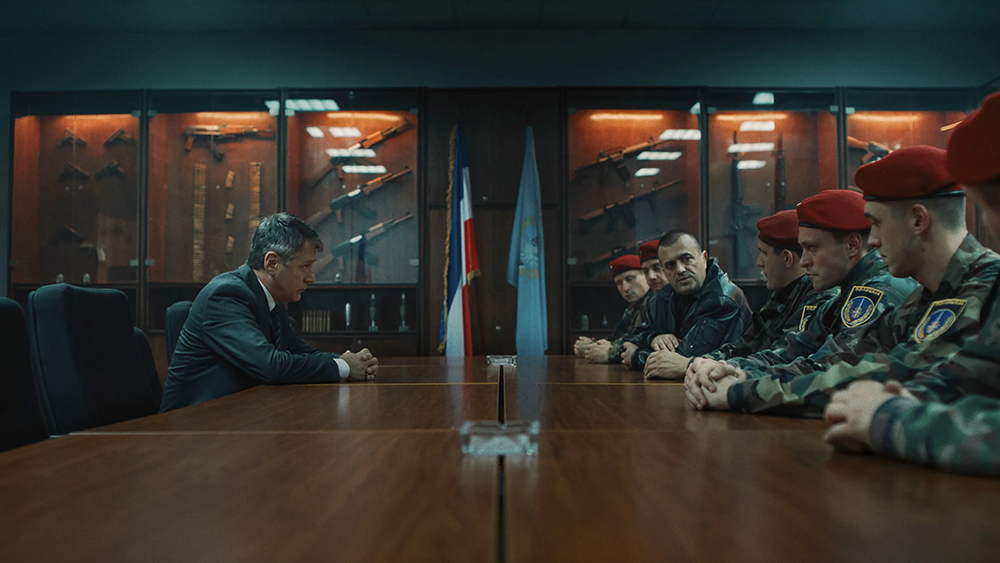Balkan Drama Creators Look to Turn Local Stories Into Global Hits
Two buzzy Balkan series were under the spotlight this week at the Sarajevo Film Festival, where local creatives dished on their recipe for turning regional stories into potential breakout hits.
Sunday night saw the red-carpet regional premiere of “Operation Sabre,” a Serbian crime drama that premiered in Canneseries’ Long Form Competition this year. The show, about the 2003 assassination of Serbian Prime Minister Zoran Đinđić, is created and directed by Goran Stanković and Vladimir Tagić.
Snezana van Houwelingen, who produced the series for Belgrade-based This and That Productions, in co-production with Martichka Bozhilova (Agitprop) for Radio Television of Serbia, said that the creators were thinking about global audiences from the moment they began developing the script.
“From the very beginning, we believed this story had international potential, even if it was a very local event and it takes place in Serbia,” she said. “Everything we did during the development process was related to how to make a TV show [that would] communicate with an international audience.”
Anna Rohde, international creative executive at Beta Film Group — whose distribution arm, Beta Film, is repping the series globally — said her company began circling the project as early as 2019, when it won an award during the CineLink Drama pitching sessions in Sarajevo.
“From that point, it was very clear that it was very international,” Rohde said. The Munich-based production and distribution giant — whose regional slate includes “I Know Your Soul,” a crime drama from Oscar-nominated filmmaker Jasmila Žbanić (“Quo Vadis, Aida?”), which was the big winner at this week’s Heart of Sarajevo TV Awards — was soon questioning how it could leverage its considerable international muscle into creating a breakout Balkan hit.

“I Know Your Soul” won big at the Heart of Sarajevo TV Awards.
Courtesy of Deblokada for BH Content Lab
“We discussed what we could add as a co-production partner,” said Rohde. “What could we contribute to bring it to an international audience together? It was more a question of collaboration.”
Eckert Emmanuel, acquisition deputy director at Mediawan Rights, said there’s been a shift in how the French distribution powerhouse approaches TV series. “We really want to help the producer to finance the show. That’s what we are doing more and more,” he said. “It’s very different from 10 years ago, when we just received shows” that were finished and ready to be sold. “We are more partners than just distributors.”
Earlier this year, the company announced its first foray into the Balkans at Series Mania, acquiring international distribution rights to “Constantine’s Crossing,” a supernatural World War II story about the Nazis’ hunt for powerful relics that once belonged to the Roman Emperor Constantine the Great.
Describing it as “a Serbian show with vampires, werewolves, Nazis and a mystic cross,” Emmanuel confessed the series was “not the easiest pitch.” “What drew me really is not only the quality of the production team, but also the script. And it’s always the game changer,” he said.
“Constantine’s Crossing” is an adaptation of Dejan Stojiljkovic’s Serbian bestseller and produced by Telekom Serbia and Belgrade-based Firefly Productions. The series is written by Djordje Milosavljevic and Firefly co-founder Boban Jevtić.
Jevtić, who is the former head of the Serbian film center and an accomplished film and TV writer, said that the show’s mystical elements were exactly what its creators wanted to play up as they began positioning it for the international market.

“Constantine’s Crossing” is a supernatural WWII drama.
Courtesy of Firefly Productions
“When people are thinking what kind of project we want to do on a very large scale, we wanted to do something that communicates to the world through genre, with a really strong local touch,” he said.
Such genre conventions have become a staple of international TV production, especially as emerging industries look to establish a formula that will create a defining, globally recognizable identity — each region’s equivalent of Nordic Noir.
Beta’s Rohde, however, cautioned aspiring TV creators in Sarajevo against applying a one-size-fits-all strategy in search of the mysterious alchemy behind creating a global hit.
“Here’s the bad news: there’s no recipe,” she said. “And here’s the good news: there’s so much creative energy [in a region] that’s full of stories, and it’s very much fun to have a look at each and every one of them. We are open to anything.”
Emmanuel, meanwhile, noted that the countries of the former Yugoslavia — long synonymous with turmoil and strife — stand to gain by rallying around their shared history and cultural identity.
“I think what is very important when you talk about the Balkans, we are not talking about one country,” he said. “Of course, we work with Serbia, Croatia, other countries. But I think we are stronger when we are united.”
The Sarajevo Film Festival runs Aug. 16 – 23.


